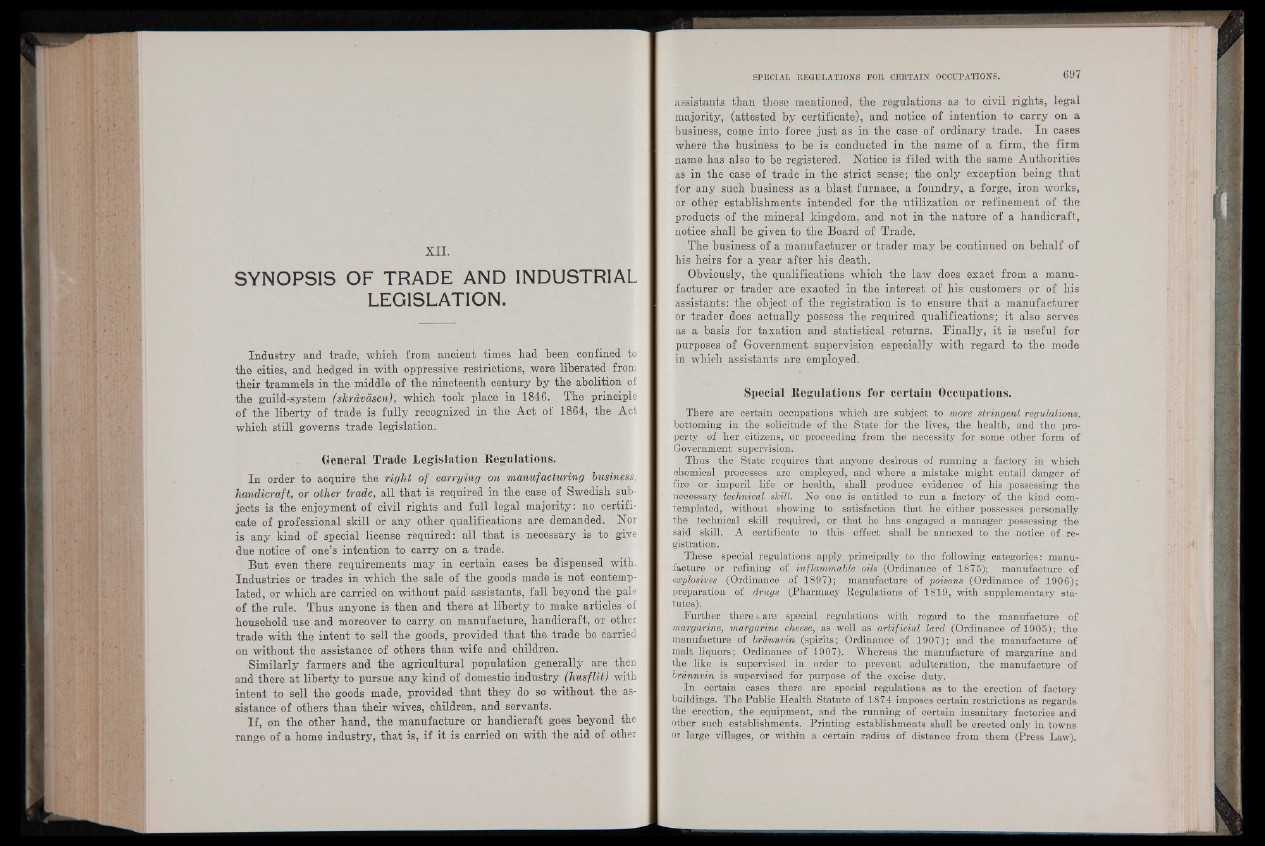
XII.
SYNOPSIS OF TRADE AND INDUSTRIAL
LEGISLATION.
Industry and trade, which, from ancient times had been confined to
the cities, and hedged in with oppressive restrictions, were liberated from
their trammels in the middle of the nineteenth century by the abolition of
the guild-system (skravasen), which took place in 1846. The principle
of the liberty of trade is fully recognized in the Act of 1864, the Act
which still governs trade legislation.
General Trade Legislation Regulations.
In order to acquire the right of carrying on manufacturing business,
handicraft, or other trade, all that is required in the case of Swedish subjects
is the enjoyment of civil rights and full legal majority: no certificate
of professional skill or any other qualifications are demanded. Nor
is any kind of special license required: all that is necessary is to give
due notice of one’s intention to carry on a trade.
But even there requirements may in certain cases be dispensed with.
Industries or trades in which the sale of the goods made is not contemplated,
or which are carried on without paid assistants, fall beyond the pale
of the rule. Thus anyone is then and there at liberty to make articles of
household use and moreover to carry on manufacture, handicraft, or other
trade with the intent to sell the goods, provided that the trade be carried
on without the assistance of others than wife and children.
Similarly farmers and the agricultural population generally are then
and there at liberty to pursue any kind of domestic industry (husflit) with
intent to sell the goods made, provided that they do so without the assistance
of others than their wives, children, and servants.
If, on the other hand, the manufacture or handicraft goes beyond the
range of a home industry, that is, if it is carried on with the aid of other
assistants than those mentioned, the regulations as to civil rights, legal
majority, (attested by certificate), and notice of intention to carry on a
business, come into force just as in the case of ordinary trade. In cases
where the business to be is conducted in the name of a firm, the firm
name has also to be registered. Notice is filed with the same Authorities
as in the case of trade in the strict sense; the only exception being that
for any such business as a blast furnace, a foundry, a forge, iron works,
or other establishments intended for the utilization or refinement of the
products of the mineral kingdom, and not in the nature of a handicraft,
notice shall be given to the Board of Trade.
The business of a manufacturer or trader may be continued on behalf of
his heirs for a year after his death.
Obviously, the qualifications which the law does exact from a manufacturer.
or trader are exacted in the interest of his customers or of his
assistants : the object of the registration is to ensure that a manufacturer
or trader does actually possess the required qualifications; it also serves
as a basis for taxation and statistical returns. Finally, it is useful for
purposes of Government supervision especially with regard to the mode
in which assistants are employed.
Special Regulations for certain Occupations.
There are certain occupations which are subject to more stringent regulations,
bottoming in the solicitude of the,. State for the lives, the health, and the property
of her citizens, or proceeding from the necessity for some other form of
Government supervision.
Thus the State requires that anyone desirous of running a factory in which
chemical processes are employed, and where a mistake might entail danger of
fire or imperil life or health, shall produce evidence of his possessing the
necessary technical shill. No one is entitled to run a factory of the kind com-
templated, without showing to satisfaction that he either possesses personally
the technical skill required, or that he has engaged a manager possessing the
said skill. A certificate to this effect shall be annexed to the notice of registration.
These special, regulations apply principally to the following categories: manufacture
or refining of inflammable oik (Ordinance of 1875)j manufacture of
explosives (Ordinance of 1897); manufacture of poisons (Ordinance of 1906);
preparation of drugs (Pharmacy Regulations of 1819, with supplementary statutes).
Further there », are special regulations with regard to the manufacture of
margarine, margarine cheese, as well as artificial lard (Ordinance of 1905); the
manufacture of brànnvin (spirits; Ordinance of 1907); and the manufacture of
malt liquors; Ordinance of 1907). Whereas the manufacture of margarine and
the like is supervised in order to prevent adulteration, the manufacture o f
brànnvin is supervised for purpose of the excise duty.
In certain cases there are special regulations as to the erection of factory
buildings. The Public Health Statute of 1874 imposes certain restrictions as regards
the erection, the equipment, and the running of certain insanitary factories and
other such establishments. Printing establishments shall be erected only in towns
or large villages, or within a certain radius of distance from them (Press Law).